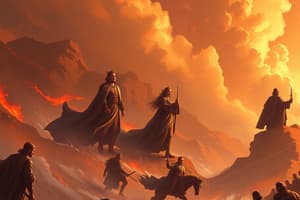Podcast
Questions and Answers
What was the primary purpose of government, according to John Locke?
What was the primary purpose of government, according to John Locke?
- To provide extensive social services to everyone
- To eliminate all forms of conflict in society
- To ensure that the government has maximum authority over individuals
- To protect the natural rights of individuals (correct)
According to Thomas Hobbes, what must the government do to ensure safety?
According to Thomas Hobbes, what must the government do to ensure safety?
- Have more power and authority over the people (correct)
- Provide limited authority to individuals
- Focus on protecting the environment
- Guarantee maximum freedoms for individuals
What differentiates procedural democracy from substantive democracy?
What differentiates procedural democracy from substantive democracy?
- Procedural democracy emphasizes the processes of decision-making, whereas substantive democracy focuses on fairness and outcomes (correct)
- Procedural democracy includes fewer stakeholders than substantive democracy
- Procedural democracy allows for unequal votes, while substantive democracy guarantees equal votes
- Procedural democracy focuses on the principles of policies, while substantive democracy focuses on the voting methods
Which of the following is NOT a form of government mentioned?
Which of the following is NOT a form of government mentioned?
What does Marx argue is the primary role of government?
What does Marx argue is the primary role of government?
The significance of a written constitution for the US colonies was that it represented a departure from which governing principle?
The significance of a written constitution for the US colonies was that it represented a departure from which governing principle?
In a democratic system, what ratio is typically required to reach a decision?
In a democratic system, what ratio is typically required to reach a decision?
Which term best describes a government controlled by the wealthy?
Which term best describes a government controlled by the wealthy?
Which of the following best defines power?
Which of the following best defines power?
What concept describes a system in which people express demands that the government responds to with policies?
What concept describes a system in which people express demands that the government responds to with policies?
Which type of policy represents a genuine response to people's demands?
Which type of policy represents a genuine response to people's demands?
According to David Easton, how is government best characterized?
According to David Easton, how is government best characterized?
What is the primary driver of the formation of government as per conquest theory?
What is the primary driver of the formation of government as per conquest theory?
Which of the following is NOT considered a base of power?
Which of the following is NOT considered a base of power?
In the context of government responses, what does political repression entail?
In the context of government responses, what does political repression entail?
What is one of the main inquiries within the study of politics?
What is one of the main inquiries within the study of politics?
Flashcards are hidden until you start studying
Study Notes
Power
- Power influences behavior, compelling others to act as desired.
- Can be exercised by individuals, animals, corporations, states, etc.
- Bases of power include:
- Money
- Authority
- Knowledge
- Religion
- Morality
- Violence
- Size and solidarity
- Charisma
- Celebrity
Politics
- Defined by who gets what, when, and how.
- Pursuit of interests is highlighted by James Madison.
- Aristotle envisions politics as the quest for a good society.
- Can involve manipulation of people.
Government
- Government as a decision-making process: authoritative allocation of values/resources.
- Responds to citizens' demands through policies, creating a feedback loop.
- Possible policy responses include:
- Neglect: ignoring requests.
- Symbolic: half-hearted policies that give the appearance of addressing issues.
- Cooptation: utilizing community leaders in policy-making.
- Substantive: granting what people want.
- Political repression: use of violence/threats to suppress demands.
- Core system values consist of:
- Capitalism
- Democracy
- Constitutionalism
Origin of Government
- Government emerges from conflict, according to conquest theory.
- Social contract theory posits that government arises from the need to mediate internal conflicts.
- John Locke emphasizes protection of natural rights (life, liberty, property) as government’s primary role.
- Thomas Hobbes advocates for a powerful government to ensure safety, emphasizing a need for authority in a chaotic "state of nature."
- Locke favored limited government; Hobbes supported greater governmental power.
Class Struggle
- Karl Marx theorized that government exists to safeguard private property.
Democracy
- Democracy is derived from two Greek words: Demos (people) and Kratos (power).
- Forms of governance comparison:
- Anarchy: no governance
- Autocracy: rule by one
- Oligarchy: rule by few
- Aristocracy: rule by the best and brightest
- Plutocracy: rule by the wealthy
- Democracy: rule by many
Procedural vs Substantive Democracy
- Procedural democracy focuses on:
- Participation of all adults in decision-making.
- Political equality (one person, one vote).
- Majority rule for decisions.
- Substantive democracy emphasizes:
- The content and fairness of government policies.
- Inclusion of basic rights in policies (e.g., freedom of speech, religion).
- Evaluates democracy based on rights protection, not just decision-making methods.
Purposes of Government
- Ensure order.
- Protect freedoms.
- Provide public goods.
- Strive for equality/equity.
Constitutional Government
- U.S. origins trace back to British colonies governed by charters.
- Colonies operated under written documents defining governmental structure, marking a shift from British tradition-based governance.
Studying That Suits You
Use AI to generate personalized quizzes and flashcards to suit your learning preferences.




